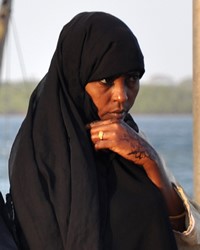Swahili can refer to both an ethnic group and to Swahili-speaking people. The name Swahili literally means "coast," and is the name traditionally given to several people groups that share a common culture, language (Swahili), and religion (Islam) living along the eastern coast of Africa. Though they are called "Swahili" by others, they prefer to be named according to their local settlements. Originally Swahilis were mainly composed of Bantu-speaking people, but because of their coastal dwellings and trade with people of the Indian Ocean and Persian Gulf, they have been influenced by, and in some cases, have intermarried with Arabic peoples. For about 2,000 years, the backbone of the Swahili economy has been commerce. They worked as cross-national merchants trading spices, slaves, ivory, gold, and grain. Today, international commerce is still important to the Swahili but to a lesser degree. Many upper-class Swahili now manage small businesses, do clerical work, and teach school. Since the Swahili are predominantly Muslim, Islamic practices play a large role in their daily activities. Today, the Swahili are mostly scattered along eastern Africa and the Persian Gulf, from Saudi Arabia to Zambia. A smaller number have scattered further in places like the UK. The Swahili who come to the UK are usually from the coastlands of either Kenya or Tanzania.
In the UK, Tanzanians are scattered throughout, though there is a concentration of them in certain London boroughs. Most of the Swahili are young adults who come to the UK for political asylum or for education. Some come for economic freedom and opportunities. Since the Swahili are Muslim, they celebrate Muslim holidays with other Muslim ethnic groups in Great Britain.
Islam is deeply ingrained in the worldview of the Swahili people. It will be difficult for them to accept other foundational answers to spiritual questions, such as salvation by Jesus Christ, not by human effort.
Nearly all of the Swahili profess to be Muslims; however, many of their traditional pre-Islamic beliefs and practices still exist. For example, they believe in many spirits, both good and evil. They also believe in the supernatural power of witches and sorcerers. The Swahili often believe folk explanations for natural occurrences.
There are open opportunities for followers of Christ to take Him to the Swahili in the UK. Someone needs to do it.
Ask God to raise up prayer teams to break up the soil through worship and intercession. Ask God to raise up businessmen who will boldly share Christ with the Swahili in Europe. Ask the Lord of the harvest to send forth many laborers into England. Pray that the Holy Spirit will encourage the small number of Swahili believers with joy and peace in. Christ.
Scripture Prayers for the Swahili in United Kingdom.
https://en.wikipedia.org/wiki/Tanzanians_in_the_United_Kingdom
| Profile Source: Joshua Project |












